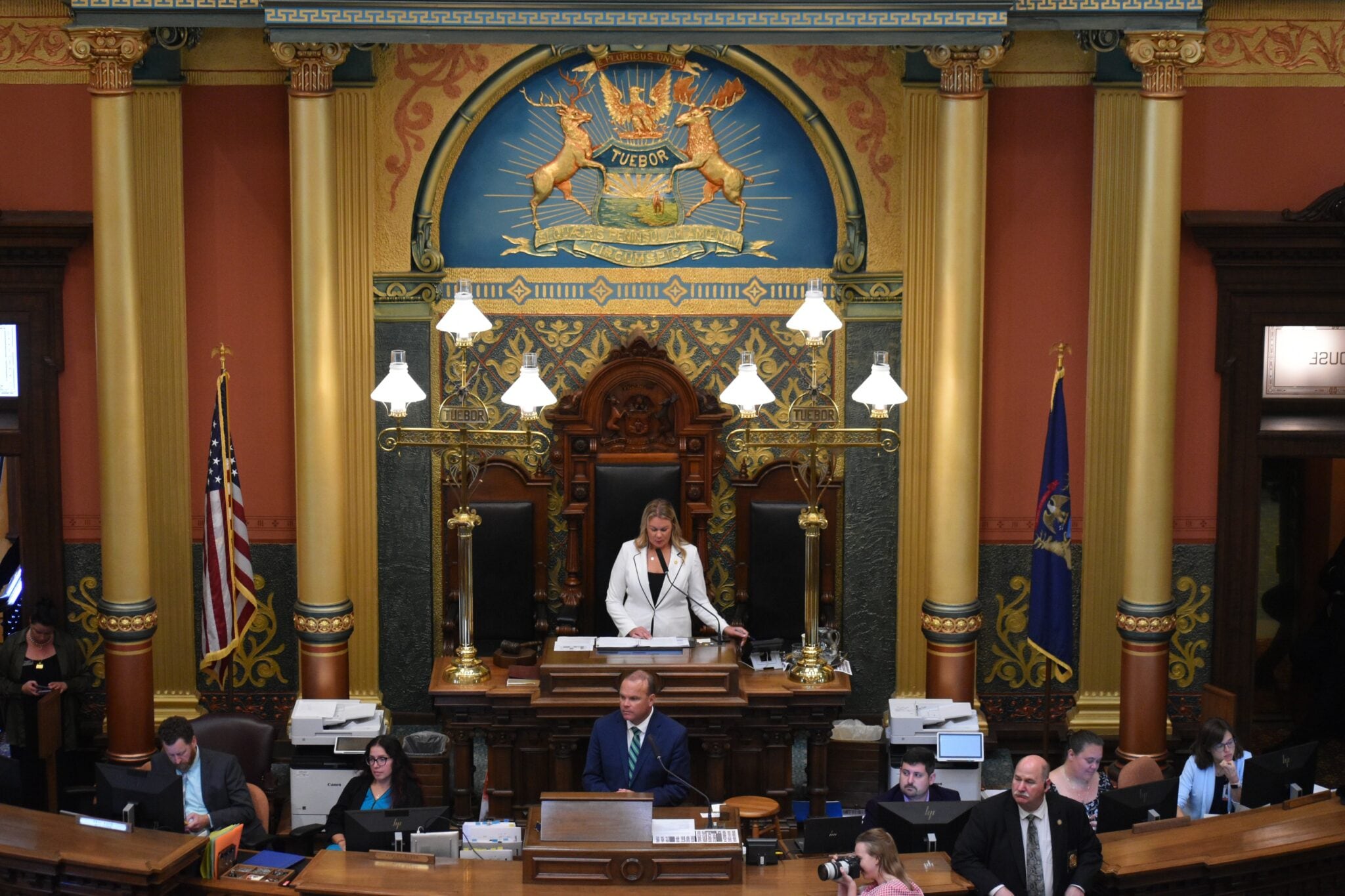Sign up for Chalkbeat Detroit’s free newsletter to keep up with the city’s public school system and Michigan education policy.
The Republican sponsor behind the Michigan House of Representatives’ plan to ban cellphones in all K-12 schools said Monday that he is going back to the drawing board to rewrite the legislation, which died on the chamber’s floor last week.
Democratic lawmakers and some members of the GOP House caucus coalesced to defeat the bill July 24 after initial bipartisan support. The measure was even floated by Democratic Gov. Gretchen Whitmer in her annual State of the State address earlier this year, showing a statewide appetite to ban phones in schools.
State Rep. Mark Tisdel, a Republican from Rochester, sponsored House Bill 4141, which would have prohibited cellphone use in schools during instructional hours only. The 53-43 vote on the House floor last Thursday saw nearly every House Democrat voting against the measure.
In an interview with Michigan Advance on Monday, Tisdel said that he plans to rewrite the bill before reintroducing it — this time with a strict bell-to-bell prohibition on cellular or wireless devices in K-12 schools.
The new bill will be based on New York state’s pending bell-to-bell cellphone ban mandating that devices must not be used for the entire school day. All public school districts there are required to publish new distraction-free cellphone use policies by Aug. 1.
Whitmer in February floated the idea of bringing a school cellphone ban to Michigan, but Tisdel said he has been working on the House’s version since 2023. A lot of that work sought to incorporate input from both sides of the aisle in the House and Senate and other stakeholders.
With the pending rewrite, Tisdel told the Advance that he was done with the “Mr. Nice Guy stuff.”
“We had it put together, incorporating the best language from all sides … and [House Democrats] played games,” Tisdel said. “If a Democratic legislature and a Democratic governor in New York, a very blue New York state, can see the value in a bell-to-bell prohibition in K-12, somehow that can’t work in Michigan? … If [Whitmer] wants a cellphone bill signed during her term, that’s what it’s going to be.”
Additional resources informing the rewrite include recommendations for the American Legislative Exchange Conference, the Manhattan Institute for Public Policy and Research, and the Brookings Institution, Tisdel said.
The conservative, nonpartisan American Legislative Conference leans toward more conservative ideals like limited government, support for free markets, and federalism.
The Manhattan Institute is generally perceived as a right-wing think tank, while the Brookings Institution is perceived to be more left-leaning.
Although he’s eying a strict bell-to-bell ban, Tisdel added that he would incorporate exemptions from federal law and would be open to allowances for “dumb” phone devices, like flip phones without broad and user-friendly access to the internet and social media applications.
“I don’t have a problem with that. That was in the last bill, and that was one of the concessions I put in,” Tisdel said. “When you’re using a flip phone, you make the phone call, you hang up, and you put the phone away, because there’s nothing else you can do with it. The problem with smartphones is you never put them away.”
Tisdel noted that he had good working relationships with two Democrats in crafting the original bill, including state Sen. Dayna Polehanki of Livonia and state Rep. Regina Weiss of Oak Park.
However, after the bill’s defeat, Tisdel blamed Democrats.
Tisdel said that some Democrats, like state Rep. Noah Arbit of West Bloomfield, publicly supported his legislation. Arbit told The Pulse on Fox 2 Detroit that he agreed with Tisdel that a ban was needed, that he supported the House legislation, championed it being passed by the Michigan Senate and then signed by Whitmer.
Arbit voted against the bill Thursday evening.
Tisdel said he received strong signals of support from Democrats in private conversations, and that he was working with some House Democrats on the legislation to make it a stronger bipartisan effort. He was also forging a deal with Polehanki to get it done in the Senate, even as the Senate was shopping its own school cellphone ban.
Tisdel was not alone in placing the blame on his Democratic colleagues: Michigan House Speaker Matt Hall, a Republican from Richland Township, echoed some of Tisdel’s talking points when speaking to the Michigan Capitol press corps following Thursday’s session.
A message seeking comment from a House Democratic caucus spokesperson regarding those criticisms, and the alleged broken deals, was not returned at the time of publication.
Several key Republicans who could have moved the measure over the finish line either voted against the bill or were absent from session.
Notably, Republican state Reps. Steve Carra of Three Rivers, James DeSana of Carleton, Jaime Greene of Richmond, David Martin of Davison, and Pauline Wendzel of Watervliet were either absent or voted in opposition to House Bill 4141.
The Detroit News reported last week that DeSana was absent from Thursday’s session in protest of Hall not taking up his legislative priorities. Tisdel said he believed that DeSana would have been a likely yes vote.
Messages seeking comment from Carra, Greene and Wednezel were not returned at the time of publication.
When Tisdel was asked about those defections, he said the situation was unfortunate, but also represented just another day in Lansing with political games aplenty.
He was disappointed, however, in some of his more conservative colleagues who voted against the bill.
“It’s a 2-to-1 legislative layout, the governor and the [Democratic-controlled] Senate against us,” Tisdel said. “We don’t need any barrels inside the caucus pointing at us, as well. It’s just frustrating. I don’t know how this perception got to be that some of these individuals who vote no all the time are the most conservative members. They’re simply enablers.”
Ben Solis is a reporter for Michigan Advance. You can reach him at bsolis@michiganadvance.com.






